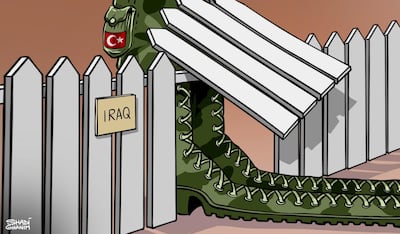In the past decade, Turkish meddling in Arab affairs has wreaked havoc in the Middle East and the Mediterranean. On Tuesday, two Iraqi officers were killed in what Baghdad says was a “blatant Turkish drone attack” in the semi-autonomous Kurdistan region of Iraq. Ankara has been conducting raids in the area since June as it targets Kurdistan Workers' Party rebels, with little care to civilian losses incurred.
Despite the fact that Baghdad has repeatedly summoned the Turkish ambassador, and senior Iraqi officials have now cancelled a visit by Turkey’s defence minister, Ankara has shown no sign of backing down. Dr Anwar Gargash, the UAE Minister of State for Foreign Affairs, said that the UAE "stands with Iraq in the ongoing Turkish violations of its sovereignty".
From Greece to Iraq to Libya, Turkey is encroaching on the sovereignty of other states and creating divisions. For years, Turkey has intervened in Syria, its neighbour to the south. Last year, it launched an offensive in the country’s north and seized Syrian territory, where it aims to resettle millions of Syrians living in Turkey as refugees.
Since June, Idlib’s Salvation Government as well as the Syrian Interim Government, ruled by Turkey’s allies, have both officially adopted the Turkish lira in place of the Syrian pound, even as both nations deal with an economic crisis and currency devaluation.
In the Eastern Mediterranean, Ankara is strengthening its grip on maritime territory also claimed by Greece, Cyprus and Egypt. Last November, Turkish President Recep Tayyip Erdogan struck two deals with Fayez Al Sarraj, who leads Libya’s Government of National Accord, essentially offering military backing in exchange for control over gas-rich waters in the Mediterranean Sea. The agreement has created diplomatic tensions with regional and European nations, which raised their concerns within Nato and escalated the ongoing conflict in Libya.
As Lebanon deals with political and economic crises, Ankara has aggressively pushed its agenda there, too. The Lebanese capital witnessed a devastating explosion at its main seaport last week, leaving more than 171 people dead and thousands more injured and homeless. Days after the blast, Turkish Foreign Minister Mevlut Cavusoglu visited Beirut, making offers of Turkish nationality to Lebanese who identify as 'Turks'. While Turkey has flown aid to Beirut and expressed sympathy with its people, it has also preyed on sectarianism that plagues Lebanese politics in order to advance its own interests.
Turkey has pursued the same divisive strategy in Libya, where Ankara’s own goals supersede the need to find a diplomatic agreement. While Turkish people suffer from the economic downturn caused by coronavirus, which has compounded a financial crisis that has dragged on for years, the government has shown little regard to its internal troubles, choosing instead to double down on its expansionist agenda. Turkey must stop involving itself in the affairs of other countries, where it has only brought more violence and division, and instead look after the wellbeing of its own people.



